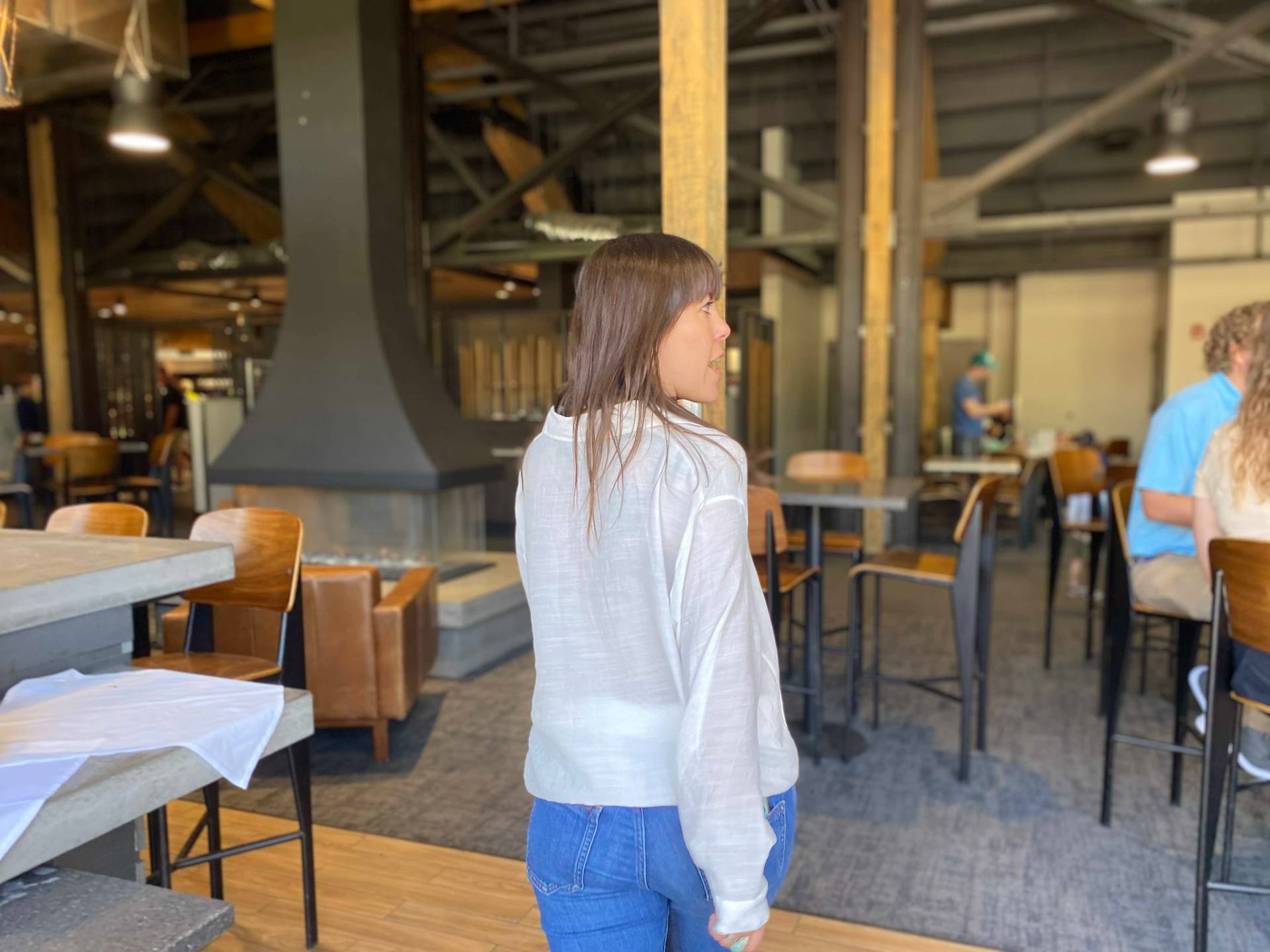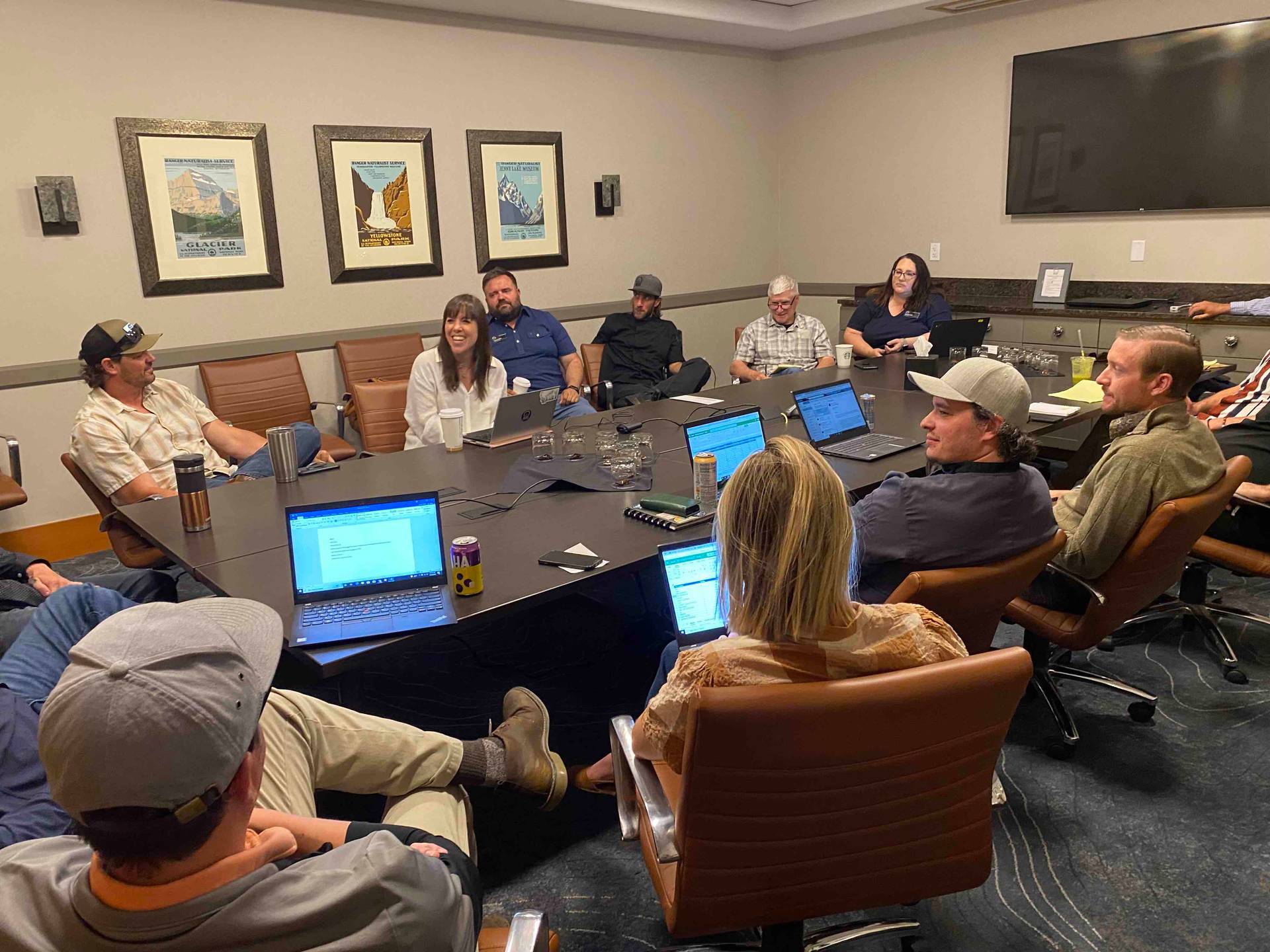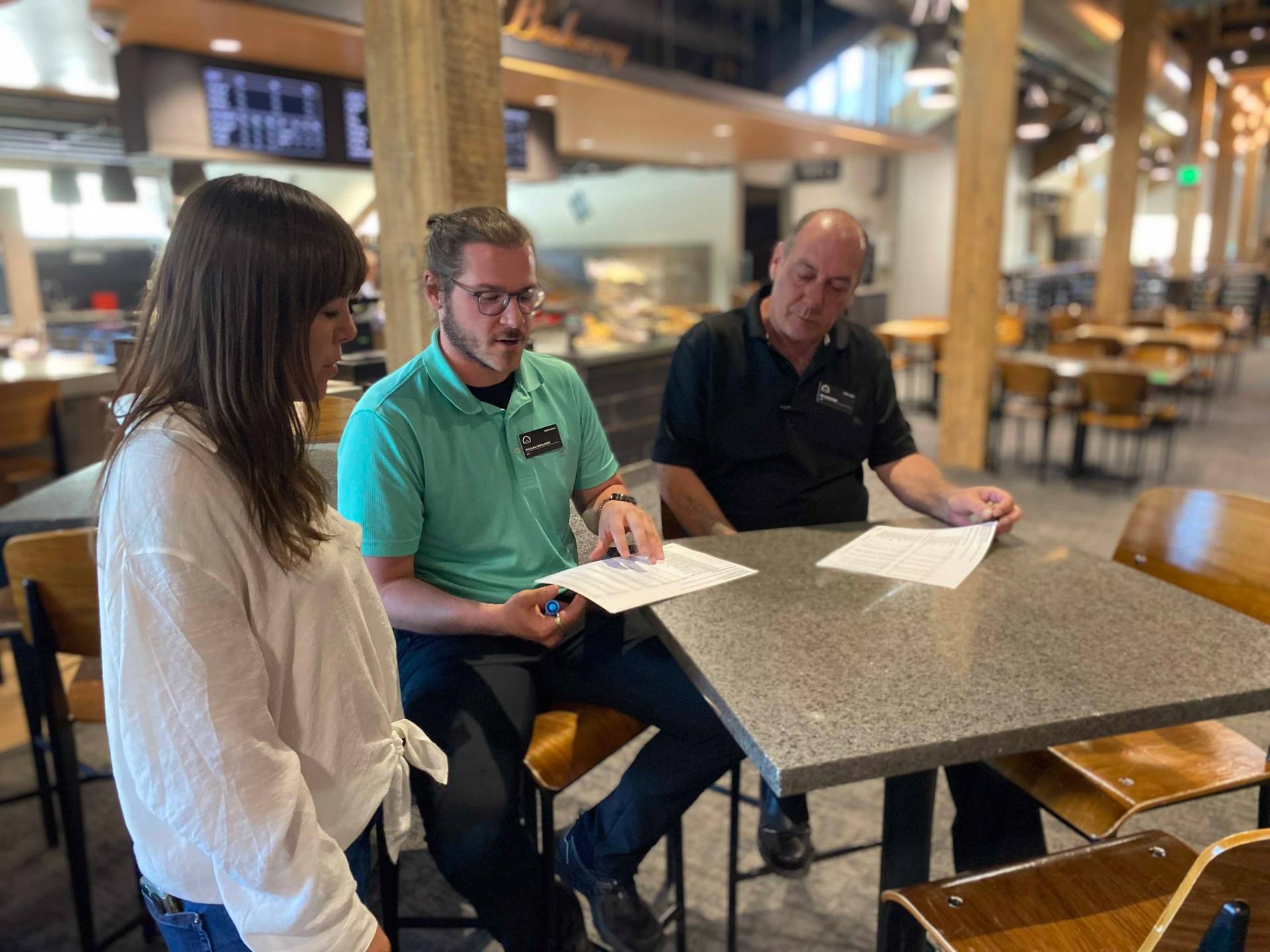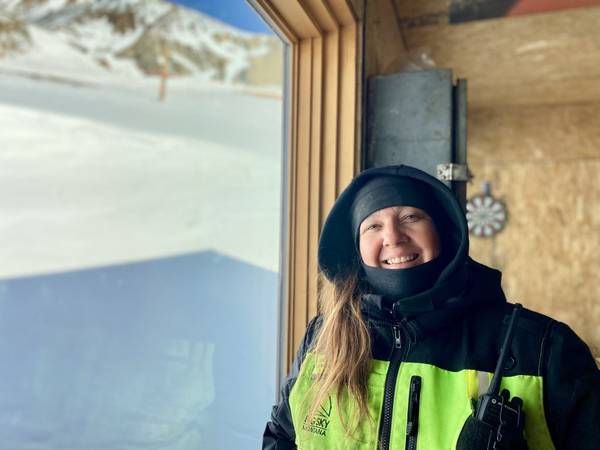
The Director of Talent and Culture
What it Takes: on any given day, it takes approximately 935 people with a wide array of skills and knowledge to make Big Sky Resort run. Together, these individuals form a complex, agile human machine that is constantly adjusting to changing conditions. This series chronicles “what it takes” to operate the resort through the eyes of some of these people.
MJ Matute walks into Westward Social, and a server meets her at the door, seemingly floating across the restaurant in his excitement to see her.
“I’ll take your table,” he says, all smiles.
“Hi Máté,” she says. “We’ll sit on the patio.”
It’s just before noon, and the mountain sun is already strong. I follow the two of them outside, and we sit at a table in the shade with a view of the peak.
“Can I bring you something to drink, to start?” Máté asks. We order water, and he disappears inside.
Matute picks up the menu, pushing her straight brown hair behind her ear. A single turquoise fringe earring sweeps with it.

The director of talent and culture in Big Sky’s food and beverage department, Matute is doing a pre-audit at Westward to prep the team for an official audit—basically a secret shopper-type of review from Big Sky’s parent company, Boyne. From making sure everyone’s wearing name tags, to timeliness of service, food quality, and music, Matute helps ensure the team is ready.
But right now, she can’t decide what to order.
“The shrimp ceviche and lettuce wraps are nice and light,” Máté says, all smiles as he arrives with the waters. They strike up a conversation about the rodeo a group of them attended recently in Ennis, and then Matute introduces me. His name tag says he’s from Florida, so I ask about his story.
“I’m from west of Tampa,” he says.
“But tell her where you’re originally from,” Matute nudges.
“I moved to Florida at age 9. Before that, I lived in Hungary,” he says, explaining that he came to Big Sky in November of 2020, right after his 29th birthday, by way of a seasonal job near Theodore Roosevelt National Park in North Dakota.
“I wanted to learn how to ski, so I came for a season, and I ended up staying.”
It’s a classic Big Sky story. People come from all over the country and the world to work at the resort, each in search of something a little different. And they wind up contributing things far more valuable than their labor: new and diverse ideas, energy, and perspectives. Whether they stay for a season or a lifetime, they enrich the company culture.
And it’s Matute’s story, too.
Born in Lima, Peru, Matute first came to Big Sky in 2005 on a J1 visa, a student work and travel program that allowed her to work in the U.S. for a winter season. At the time, she was studying psychology at the University of Lima and came with school friends on summer break. She worked as a hostess in the Huntley Dining Room and lived in the old Mountain Lodge, just west of the Mountain Village.
“It was the most fun experience of my life,” she recalls. Now 38, Matute speaks without an accent, having spent a chunk of her childhood in Los Angeles while her father was studying and teaching at UCLA. She still chooses to live up at the mountain.
“Sometimes I walk to work at 7 a.m., and it feels like I’m the only one alive,” she said.
Between the resort-owned restaurants she’s served at and another five local businesses including the Corral, Scissorbills, and the old M.R. Hummers, Matute has worked at seven dining establishments in Big Sky.
“I love serving,” she said. “I love meeting people. I love taking care of people. I’m an extrovert, and I’m pretty positive and cheerful, so if I get a challenging table I’ll do my best to turn their day around and give them an awesome experience.”
She took a full-time admin role with the resort’s human resources department in 2012, eventually growing into a leadership position. The HR department was small at the time, so she had the freedom to build and standardize systems. What she liked best, though, was the challenge of helping employees find solutions to hard problems.
In 2019, Matute was visiting family in Peru when her current role as director of talent and culture for food and beverage was posted. A friend texted her, essentially saying, ‘this position came up and nobody matches the profile of what they’re looking for except you.’
“That position really didn't exist, or at least it was modified to fit what we thought she was capable of,” said Troy Nevded, general manager of the resort. “She’s unique. She's lived it from the other side of the coin, with both the J1 program—knowing what that looks and feels like and how it fits into our programs—plus her skill set. Her personality jives with what we need in that position. You watch the way she works from one group to the next … Honestly, I don’t know if we knew what we needed [until we had MJ in the role].”
What they needed, it turns out, is a ton of empathy. Especially for employees.
“Whether that's empathetic to the situation, the housing, the language barriers—all the things that can come with the international hires [who] are such an important part of our labor force, and a growing one that changes every year,” Nedved said.

Matute became an American citizen in February of 2020, right before the pandemic shut down the resort and most of the country. She and her colleagues used the downtime to begin establishing new systems, starting with a comprehensive guide that shows managers how to run any of the resort’s dining establishments, which Bret Daniel, Westward’s GM, says he uses every day.
She also recruits and hires new chefs and general managers for the resort’s 10 restaurants, and vets them for cultural fit.
“Are they used to working with seasonal staff? That means you’re building a team twice a year, and opening and closing a culture twice a year,” Matute explains. “What is their leadership style? Are they super old school and OK with cussing and throwing things? That’s not going to fly. We’re looking for people who can be mentors—a GM who can train an assistant manager working under them to be a future GM.”
With the recent changes in the U.S. job market, employees are harder to find, hire, and keep. That means figuring out how to support them is top priority for the resort, a tall order in a department of 450 and half of the team coming from within the U.S., and the rest on J1 and H2B work visas from Peru, Chile, Argentina, Paraguay, Costa Rica, Thailand, Kazakhstan, Jamaica, and El Salvador.
“Our culture will be the biggest factor of our future success,” said Adam Stevens, the resort’s VP of food and beverage. Stevens says he’s focused on creating an environment where it’s safe to share thoughts and feedback.
“Cultural transformations only occur when employees feel they are free to speak and share freely,” he said.
In action, that means Matute gathers feedback from her teams, helps them problem-solve, and listens closely.
“Employee culture is how you feel when you walk in through the door,” Matute said. “Do you feel appreciated, cared for, and taken care of? It’s our job as managers to make decisions based on making people feel that way. What are we doing wrong that is making you not feel appreciated?”
She’s also added bonus, recognition, and appreciation programs, and is now establishing recruitment and onboarding plans, to make sure new hires have support as they learn the ropes.

Her care and empathy extend beyond work. Through a side hustle, Vibe Tribe Artisan Jewelry, she sells silver and turquoise necklaces and rings and gives healing talismans to friends experiencing hard times or new beginnings. As a new community wellness navigator, she is planning to attend training in suicide and crisis response.
Just as Máté delivers our meals—Matute wound up going for the “Not-So-Classic Caesar”—the resort’s director of hospitality, David Marsh, sits down to talk about the new international hires arriving.
“You have people who are literally coming from across the world,” said Marsh, himself a relative newcomer to Big Sky, having come to the resort three years ago from a large hospitality company in Denver. “They leave their family and friends and come to the middle of nowhere Montana. How can we make their life seem easier? What do they need?
At weekly meetings, in addition to reviewing operational needs and revenue, Marsh, Matute, and the department’s other leaders often share how they support their teams. Just last week, Marsh and a coworker were at the airport picking up a group of new hires from Jamaica and realized none of them had bedding, so they went into Bozeman and bought them sheets and pillows before driving to the resort.
Having an inclusive and diverse culture creates value in many ways, Matute says.
There are the friendships that span time and geography, like when a chef visited previous J1 students at their home in Thailand, or the time Stevens, the department’s director, attended a former employee’s wedding in Macedonia.
For guests, it can create instant connection.
“A guest will see your nametag, and say, ‘Oh, you're from Argentina. I've skied there before,’” Matute said. “And all of a sudden, guests are requesting these servers or coming back to a certain outlet because of the people there.”
And inclusivity breaks barriers, says Matute, who’s been here for almost 15 years now.
“Here I was, a J1 from Peru. [An inclusive culture] provides our team with a future they didn't even know was an option.”
Emily Stifler Wolfe is a writer and business consultant based in Bozeman, Montana, and a former ski patroller in Big Sky. Find her at emilystiflerwolfe.com.
More to Explore

Making Snowsports a More Inclusive Space
Big Sky community member Carolyn Stempler is no stranger to breaking the proverbial glass ceiling.
Read More
The Director of Lift Maintenance
Laurel Blessley planned to spend a winter working at the resort. 23 years later, she’s managing a department.
Read More







